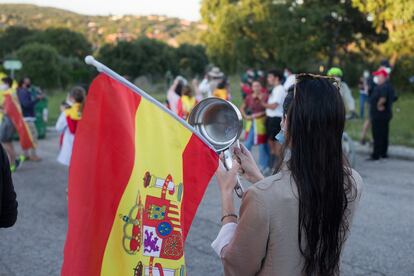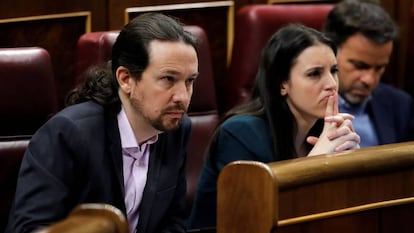Spanish government ups security measures over concerns for safety of ministers
Podemos politicians Pablo Iglesias and Irene Montero have been subjected to four months of harassment outside their home in Madrid, and this week were forced to cut short their vacation

The government is taking the ongoing harassment that is being suffered by Unidas Podemos politicians Pablo Iglesias and Irene Montero very seriously, considering it not to be an isolated incident but rather the result of a political climate that is being fanned by the far right. The executive is opting to increase the security measures outside the Madrid home of the deputy prime minister and his partner, who is the equality minister in the coalition government, and is preparing for a potential worsening of the situation this coming fall.
The situation is under control, according to government sources, but the level of harassment that is being registered is “worrying,” they add. As well as the Iglesias family, who have three children under the age of three, other ministers from the Socialist Party (PSOE)-led coalition government are also being targeted, and an atmosphere of hatred is prevailing in far-right groups and on social media.
The group of demonstrators who bang pots and pans and use megaphones to disturb the family, and to demand that they leave Spain, has an easy job of accessing the area
In fact, the majority of ministers changed their usual habits this summer, and are avoiding public areas. No one, however, has been subject to the kind of harassment that Iglesias and Montero have, with daily noisy protests outside their house in the Madrid municipality of Galapagar, and the online revelation of where they were vacationing in Asturias, which forced them to cut short their holiday on Monday due to fears for the safety of their children.
The protests that are taking place outside the Iglesias family residence are difficult to tackle, government sources explain. The house is in an open development, with no barriers to entry in the area. Given that it isn’t an apartment, nor in a closed estate, it is very difficult to control who comes in and out. The group of demonstrators who bang pots and pans and use megaphones to disturb the family, and to demand that they leave Spain, has an easy job of accessing the area.
The Civil Guard has tried to restrict access to the street where the house is located, and sometimes requests the identification of those who turn up to protest and hurl insults. But government sources explain that it’s hard to stop people coming through, given that neighboring residents are complaining that they are being prevented from reaching their own homes. Civil Guard officers have made statements to the courts about what is happening, while Iglesias and Montero themselves have filed reports against specific demonstrators who turn up every day, among them a counselor for the far-right Vox party in the Galapagar local council. But so far the judge in charge has rejected all of their complaints, which has left the authorities with little room for maneuver.

In the wake of the couple cutting short their vacation, measures have been stepped up, and on Monday the Civil Guard were much stricter about who could approach the property. “When they came back to Galapagar, it was as if they were waiting for them, because they found out about it quickly and they started to harass them again,” Unidas Podemos sources explain.
Unidas Podemos deputy Enrique Santiago, whose family own the property where the couple were vacationing in Asturias, claims that the public prosecutor “isn’t doing anything,” and that it should take action. The prosecutor general’s office told EL PAÍS on Wednesday that they have not been informed of these incidents via any of the three usual channels that would permit them to take action: a report filed by a private citizen, a police statement or direct knowledge of the events via prosecutors.
Public Works Minister José Luis Ábalos, of the Socialist Party, has also been targeted by the far right in his home.
Sources from the prosecutor add that they cannot begin an investigation if another court has already begun a probe. Iglesias and Montero have filed their complaints in Galapagar, without having taken the matter to the prosecutor general. “If they refer something to us, it will be investigated,” the same sources say. “But, of course, the prosecutor is not inactive with regard to any behavior that could infringe on an institution or members of institutions,” the same sources insist. They cite the case of Judge Pablo Llarena, who was in charge of the trial of the leaders of the Catalan pro-independence drive of 2017. An investigation was opened after complaints and police reports were filed about the harassment that he was subjected to.
Transport Minister José Luis Ábalos, of the PSOE, has also been targeted by the far right in his home. This August, most members of the government have opted for peaceful areas for their vacations or have decided not to go away at all, remaining in their homes. The situation in the coming fall may be even more complicated, the Interior Ministry is predicting. The political climate is likely to become even more intense, given that Vox has filed a motion of no confidence against PSOE Prime Minister Pedro Sánchez – albeit one that is doomed to failure, due to the current lack of support for it from other parties in Congress.
The current situation, however, is highly unusual, and the far right has not presented a problem such as this one for many years. Sources from the Interior Ministry insist, however, that the situation is under control and that the security forces have plans for all types of scenarios. It is also engaged in intense intelligence work, in order to keep tabs on any movements by extremist groups that could cause problems.
“Democratic medicine”
Over the past week a number of politicians, including Defense Minister Margarita Robles, have recalled the words of Pablo Iglesias in 2013, when he described noisy protests – known in Spanish as escraches – being staged at the time outside the homes of some members of the then-Popular Party government as being “democratic medicine.” “All escraches are bad,” Robles told reporters this week.
Podemos leaders flatly reject that what is happening to the Iglesias family at the moment could be considered an escrache. In 2013, when the Podemos leader made that statement, jeers and protests against politicians were common in the street and at public events, in the wake of the 15-M protest movement against austerity and political corruption that erupted in 2011. Some of these demonstrations even took place outside the family homes of such leaders, as was the case for then-Deputy Prime Minister Soraya Sáenz de Santamaría. Podemos sources say that this situation is different, and that Iglesias and Montero have been subject to constant harassment during a four-month period. The demonstrations, they say, are not about anything specific; they are merely messages of hate and calls for the couple to leave the country.
English version by Simon Hunter.
Tu suscripción se está usando en otro dispositivo
¿Quieres añadir otro usuario a tu suscripción?
Si continúas leyendo en este dispositivo, no se podrá leer en el otro.
FlechaTu suscripción se está usando en otro dispositivo y solo puedes acceder a EL PAÍS desde un dispositivo a la vez.
Si quieres compartir tu cuenta, cambia tu suscripción a la modalidad Premium, así podrás añadir otro usuario. Cada uno accederá con su propia cuenta de email, lo que os permitirá personalizar vuestra experiencia en EL PAÍS.
¿Tienes una suscripción de empresa? Accede aquí para contratar más cuentas.
En el caso de no saber quién está usando tu cuenta, te recomendamos cambiar tu contraseña aquí.
Si decides continuar compartiendo tu cuenta, este mensaje se mostrará en tu dispositivo y en el de la otra persona que está usando tu cuenta de forma indefinida, afectando a tu experiencia de lectura. Puedes consultar aquí los términos y condiciones de la suscripción digital.








































